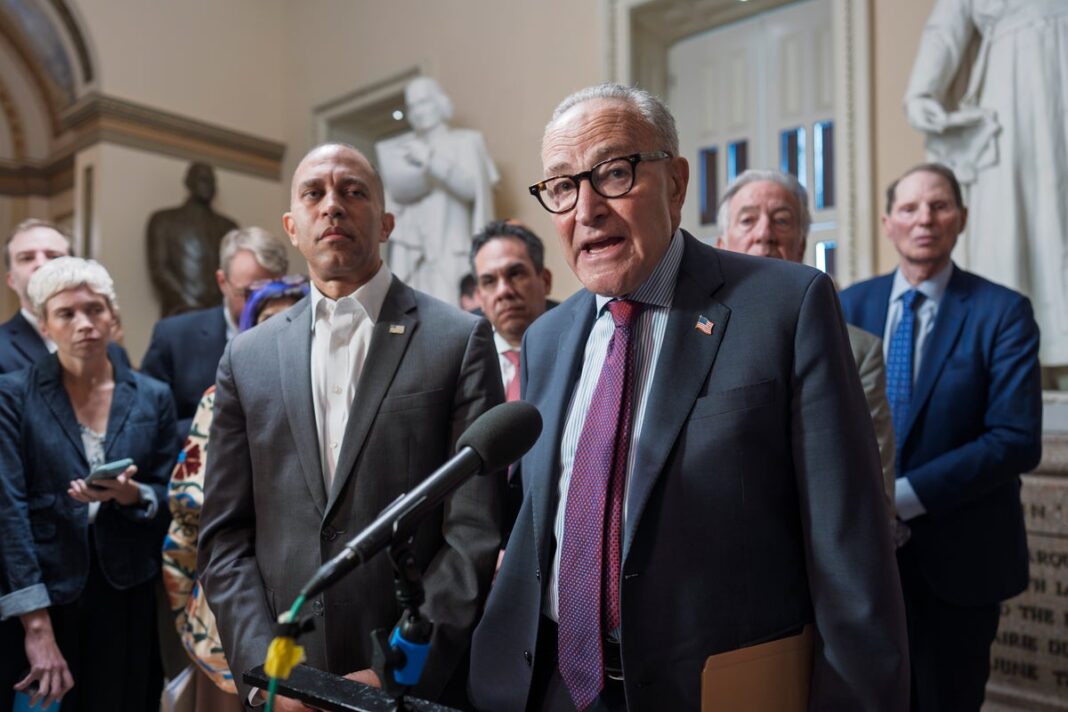The Political Turmoil: Trump Cancels Critical Meeting with Congressional Leaders
In a significant move that has raised eyebrows across the political spectrum, former President Donald Trump recently canceled a planned meeting with House Minority Leader Hakeem Jeffries and Senate Minority Leader Chuck Schumer. This decision comes at a time when the federal government teeters on the brink of a shutdown, set to occur in just seven days.
Context of the Cancellation
Trump’s announcement was made ahead of his address at the UN General Assembly, where he expressed discontent with what he termed “unserious and ridiculous demands” from Democratic leaders. In a post on his Truth Social platform, he stated, “After reviewing the details… I have decided that no meeting with their Congressional Leaders could possibly be productive.” This statement highlights the growing divisions between the two major parties as they navigate crucial legislative issues.
The meeting was initially framed as a collaborative effort to address pressing topics, such as rising healthcare costs. Schumer and Jeffries had expressed optimism about engaging with Trump to avert what they described as a “Republican-caused shutdown.” They pointedly emphasized the need for cooperation in solving the healthcare crisis affecting many Americans.
Key Issues at Stake
With Congress currently out of session due to the Jewish high holidays, the urgency to address the impending government shutdown is palpable. Democrats are advocating for a “clean” continuing resolution (CR) that could prevent a lapse in funding, while many also push for extending enhanced subsidies for the Affordable Care Act, which were previously expanded during the COVID-19 pandemic. This proposed extension is contentious, particularly for Republicans who are hesitant to negotiate terms involving healthcare reforms.
Trump’s rhetoric reflects broader frustrations among Republicans, who are sighing under the pressure of needing bipartisan support. With only 53 seats in the Senate, Republicans will need support from at least seven Democrats to pass any continuing resolution.
The Fallout from Trump’s Cancellation
The cancellation has triggered a series of reactions from Democratic leaders. Schumer, in a rather pointed remark, seemed to suggest that Trump’s willingness to engage is contingent upon his ability to set the agenda. “Happy New Year, Mr. President,” Schumer tweeted, underscoring the frustrations his party feels about Trump’s abrupt decision.
On the other hand, Jeffries took a firmer stance, declaring, “The extremists want to shut down the government because they are unwilling to address the Republican healthcare crisis that is devastating America.” This reflects a serious concern about the ramifications of a government shutdown, particularly for millions who rely on federal services, many of which may be impacted.
A Broader Political Landscape
Trump’s cancellation of the meeting is emblematic of the ongoing tension within U.S. politics, especially as both parties approach potentially volatile negotiations. Prior to this cancellation, Trump had encouraged Republican lawmakers not to engage with Democrats, fearing it could dilute their agenda. His recent statements also included a litany of grievances, ranging from issues surrounding transgender athletes to escalating crime rates, indicating a broader strategy of rallying his base by invoking cultural battles.
As the deadline for government funding looms closer, both Congressional leaders and Trump find themselves in a precarious position. The consequences of a shutdown could be dire, raising questions about the public’s confidence in the government’s ability to effectively manage and address pressing issues.
The Challenge Ahead
Looking ahead, the challenge is substantial for both sides. Republicans are tasked with unifying their approach, while Democrats must balance the demands of their base with the need for bipartisan solutions. With the looming threat of a government shutdown, it remains to be seen how these political dynamics will unfold in the coming days, and whether Trump’s decisive cancellation will serve as a catalyst for further discord or prompt a reconsideration of bipartisan negotiation strategies.
As this political saga continues, the implications for federal operations, social welfare programs, and the broader healthcare discussion hang in the balance, leaving many Americans anxiously awaiting a resolution.



